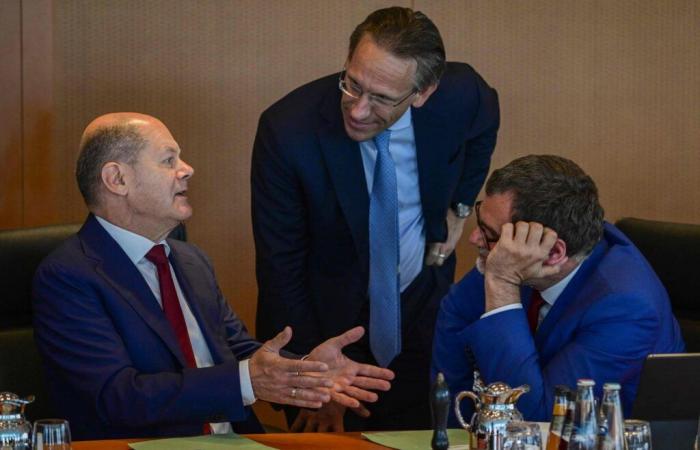The German Chancellor, Olaf Scholz, is canceling his trip to COP29 in Baku, which begins on Monday, a government spokesperson announced on Thursday, November 7, the day after the fall of his coalition and while the conservative opposition is pressing the chancellor to organize a vote of confidence in the coming days.
The chancellor has set the date of January 15 for this vote in parliament and does not intend to deviate from it, determined to remain in power at the head of a minority government until the organization of early legislative elections.
Olaf Scholz was to spend Tuesday at the 29e UN climate change conference (COP29), deliver a speech there and participate in several climate events. This COP will bring together 198 countries in Baku, Azerbaijan, starting on November 11, and will last at least until November 22. But the chancellor's agenda is turned upside down due to the political crisis shaking Germany.
In addition to the conservative opposition CDU/CSU, three other parties are demanding a vote of confidence in the coming days: the AfD, a far-right party credited with second place behind the conservatives in voting intentions; the left-wing BSW party; and the liberals of the FDP, expelled from the government. “We simply cannot afford to have a government without a majority for several months”said CDU-CSU leader Friedrich Merz.
Read also | Article reserved for our subscribers In Germany, Olaf Scholz dismisses the finance minister and marks the end of his coalition
Read later
“Our country has no time to lose”
The long-feared government implosion comes at the worst time for Germany, grappling with a serious industrial crisis, and for Europe, which is worried about the impact on its trade and security. election of Republican Donald Trump.
German business and industrial circles are also calling for elections quickly, as are the AfD, a far-right party, the BSW (radical left), as well as Christian Lindner, the recently sacked finance minister, whose departure caused the fall of the heterogeneous coalition made up of the Social Democrats, the Greens and its liberal party (FDP). “Our country has no time to lose”he insisted.
Read also | Article reserved for our subscribers US presidential election: Germany fears it has a lot to lose with Donald Trump's victory
Read later
German President Frank-Walter Steinmeier called on politicians to “responsibility”stressing that the country had “need for stable majorities and effective government”. The president, a social democrat, like the chancellor, will be responsible for dissolving the Bundestag if Olaf Scholz is, as expected, outvoted by Parliament.
The government's agony lasted for many months due to deep differences on budgetary and economic policy. The social democrats and environmentalists are in favor of reviving the stalled national economy through spending, while the liberals advocate social cuts and strict budgetary discipline.
Uncertainty over the 2025 budget
Mr. Lindner is replaced in finance by one of Olaf Scholz's close advisors, Jörg Kukies, a 56-year-old former investment banker. Two other liberals are leaving the government, while the Minister of Transport, Volker Wissing, decided to stay and left his party in the process. He will be responsible for justice, in addition to transport.
The government is now a minority, but “we are in office, we can make decisions and we will make decisions”assured the vice-chancellor, Robert Habeck (Greens). The opposition refuses any support for the government. As for the 2025 budget, the preparation of which is at the origin of the current crisis, there is uncertainty. A minimum and reduced version could be applied from January.
Read also | Article reserved for our subscribers In Germany, calls to reform the “debt brake” are increasing
Read later
Coalition breakdowns are very rare in Germany, but the paralysis of the Scholz team could not continue, many commentators believe. “Luckily it’s over”headlines the magazine The mirrorsummarizing the general feeling in the country. Olaf Scholz hoped that the election of Donald Trump, a fan of protectionism and diplomatic confrontations, would force his coalition to close ranks. But the opposite happened.
The World Application
The Morning of the World
Every morning, find our selection of 20 articles not to be missed
Download the app
If elections were to be held tomorrow, the conservative opposition would come out on top with 32% of the votes, according to a new poll on Thursday from the Ipsos institute, carried out at the beginning of November, before the breakup of the coalition. And Mr Merz is said to be the favorite to become chancellor. But he too would have difficulty forming a majority coalition, with the far-right AfD lying in wait in second position (18%) with whom he rejects any government alliance. The SPD is credited with 15%, the Greens with 11%, and the FDP with just 5%.
Read also | Article reserved for our subscribers In Germany, the deterioration of the economy puts Olaf Scholz's coalition to the test
Read later






